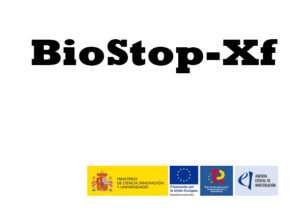
Novel biological tools to reduce the ecological impact and restore the natural and agricultural ecosystems threatened by the quarantine plant pathogen Xylella fastidiosa
The proposal targets a quarantine plant pathogen, Xylella fastidiosa, a xylem-associated bacterium that is causing significant (socio)economic and environmental losses to European (including Spanish) agriculture and forestry, trade, and the environment.
X. fastidiosa has been identified as a major transboundary plant pest, posing a serious threat to food security and the environment worldwide. Thus, X. fastidiosawas ranked first in the priority list of pests in the EU for different environmental impact indicators that included the evaluation of impacts on street trees, parks and natural and planted areas; undesired impacts of control measures on the environment; and impacts on biodiversity and ecosystem services.
This is a two- year’s proposal started in December 2022 and will end in november 2024 and is financed by Unión Europea- NextGeneration EU/PRTR .The overall aim of the present Project is to develop interdisciplinary, translational approaches to provide novel innovative biological tools to reduce the ecological impact of control measures and restore X. fastidiosa threatened agricultural and natural ecosystems. This approach will consider the genetic diversity present in the EU areas where X. fastidiosa is established (subsp. fastidiosa ST1, multiplex ST6, ST7 and ST81 and subsp. pauca ST53 and ST80).
To achieve the objectives, an interdisciplinary research consortium will join to develop innovative biological tools that can be used at a later stage, to implement tailored IPM programs for mitigating X. fastidiosa impact in the EU, particularly in Spain, and help to restore the biodiversity of affected agricultural and natural ecosystems in line with the EU Green Deal and the Farm to Fork strategies.



The project aims:
– To identify and select xylem -and vector foregut- inhabiting bacteria with biocontrol potential against X. fastidiosa subspecies.
This objective will be led by IAS-CSIC-Subproject TED2021-130110B-C41.
– To evaluate the biocontrol potential of already isolated and/or new bacteriophages against X. fastidiosa subspecies.
This objective will be led by IVIA-Subproject TED2021-130110B-C42.
– To select natural and synthetic functional peptides against X. fastidiosa subspecies.
This objective will be led by University of Girona-Subproject TED2021-130110B-C43.
– To explore the natural resistance (non-hosts) or tolerance to X. fastidiosa in main perennial crops, forestry species, and plants from the natural landscape of affected outbreaks areas in Spain.
This objective will be developed by all partners.
– To develop an active coordination, dissemination, communication and technology transfer plan of project activities and results involving stakeholders’ engagement.
This objective will be led by IAS-CSIC and developed by all partners.
For more information, please visit the project web page https://biostop-xf.org/

